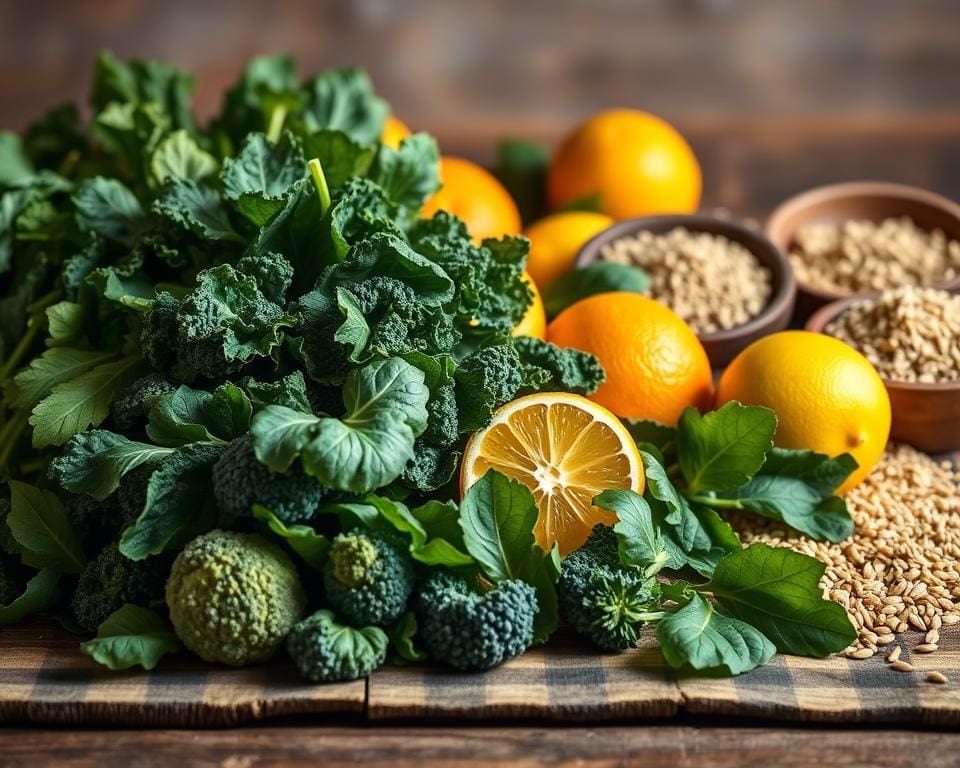Folic acid, a vital B-vitamin (B9), is essential for maintaining various bodily functions, including DNA synthesis, cell division, and growth. Its significance becomes even more pronounced during periods of rapid development, such as pregnancy and infancy. As individuals look to improve their diets naturally, understanding what foods are good for folic acid is crucial. This article will delve into the importance of folic acid, highlighting folic acid rich foods that can enhance overall health and wellbeing.
Understanding Folic Acid and Its Importance
Understanding what is folic acid reveals its significance in maintaining health. Folic acid, or folate in its natural form, plays an instrumental role in the body, particularly in the production of red blood cells and the proper functioning of DNA and RNA. Regular intake of folate sources is essential, as the body cannot store it effectively.
What is Folic Acid?
Folic acid is a B-vitamin, specifically vitamin B9, crucial for various bodily functions. Found in foods like leafy greens, legumes, and fortified cereals, it supports overall health and well-being. Awareness of folic acid benefits extends beyond its use during pregnancy, making it important for individuals of all ages.
The Role of Folic Acid in the Body
This vitamin is vital for the synthesis of DNA and RNA, influencing cell division and growth. Beyond these functions, folic acid is linked to numerous health advantages. It supports brain function, aids in reducing the risk of heart diseases, and plays a crucial role in preventing neural tube defects during pregnancy. Ensuring adequate folate intake can contribute to a healthier life.
Common Myths About Folic Acid
Many misconceptions exist about folic acid. A common myth is that only pregnant women require it. In truth, maintaining optimal levels of folate benefits everyone, enhancing health and well-being across different life stages. Misunderstanding these facts may lead individuals to neglect their dietary needs.

What Foods Are Good For Folic Acid
Incorporating a variety of nutrient-rich foods into your diet can significantly enhance your intake of folic acid. Many options provide natural sources of folic acid, ensuring that you meet your daily dietary requirements. Here, we will explore some of the most beneficial foods that can help you achieve optimal levels of folate.
Leafy Greens and Vegetables
Leafy greens, such as spinach, romaine lettuce, and kale, are among the finest foods high in folic acid. These vibrant vegetables not only help maintain a healthy diet but are also packed with essential vitamins and minerals. Adding these greens to your meals can effortlessly boost your folate intake and contribute to overall wellness.
Legumes and Pulses as Folic Acid Sources
Legumes and pulses, including lentils, chickpeas, and black beans, represent excellent folate foods. Besides their high protein content, these foods serve as substantial natural sources of folic acid. Incorporating legumes into stews, salads, or as side dishes can elevate your nutritional profile while providing a delicious and satisfying meal.
Fruits That Boost Folic Acid Levels
Certain fruits play a crucial role in boosting folic acid levels. Citrus fruits like oranges and lemons stand out, along with bananas and avocados, which are also good sources of this essential nutrient. Including a variety of these fruits in your daily diet not only enriches your meals but contributes significantly to your overall folate intake.
Folic Acid Rich Foods to Include in Your Diet
Incorporating a variety of folic acid rich foods into your diet not only supports your health but enhances your overall nutrition. Folic acid plays a crucial role in various bodily functions, and choosing the right foods can help maintain adequate levels.
Cereal and Grain Options
Fortified breakfast cereals and whole grains like quinoa and whole wheat products offer excellent sources of folic acid. Many brands enrich their cereals with additional folate, making them a convenient option for anyone looking to boost their folic acid in diet. Including these grains in your meals can significantly contribute to your daily intake.
Nuts and Seeds for a Healthy Snack
Nuts and seeds serve as tasty, nutritious snacks while enriching your diet with folic acid. Sunflower seeds and almonds provide not only healthy fats but also essential nutrients. Regular consumption of these foods can help maintain adequate folic acid levels.
Animal Products with Folic Acid
Animal products such as liver, chicken, and eggs are valuable sources of folic acid. Including these foods in your meals diversifies the sources of folate in your diet while providing essential proteins and other vital nutrients.
Folate Sources Beyond Food
For many individuals, meeting the required folate levels through diet alone can be a challenge. Thankfully, there are alternative methods to ensure adequate intake. Exploring the options of folic acid supplements and fortified foods provides an effective approach to enhancing folate sources in your daily routine.
Folic Acid Supplements: Are They Necessary?
Folic acid supplements offer a practical solution for those needing a boost in their folate intake. These supplements come in various forms, including tablets and multivitamins, catering to different preferences and needs. Pregnant individuals and those with specific medical conditions may particularly benefit from additional folic acid, ensuring both themselves and their developing babies receive proper nutrients.
Fortified Foods: A Convenient Way to Boost Intake
Fortified foods serve as an excellent option for individuals seeking to enhance their folate consumption. Many everyday products, such as certain brands of bread, pasta, and breakfast cereals, are fortified with folic acid. These fortified foods simplify the process of achieving daily dietary recommendations. Reading product labels helps consumers identify which items offer this beneficial enrichment.
Folic Acid Benefits for Overall Health
The consumption of adequate folic acid yields numerous health benefits, making it an essential component of a balanced diet. Folic acid plays a vital role in promoting healthy cell function, which is critical for growth and repair within the body. This benefit is particularly emphasised during pregnancy, where sufficient intake of natural sources of folic acid can help prevent developmental issues in the fetus, ensuring healthy growth.
Research indicates that maintaining adequate folate levels may also contribute to lowering the risk of cardiovascular diseases. By homoeostatically regulating levels of homocysteine, an amino acid linked to heart disease, folic acid can help support heart health and overall well-being. Incorporating folate-rich foods into daily meals is not just a nutritional choice, but a proactive step towards enhanced cardiovascular function.
Beyond its physical benefits, folic acid has been associated with improved mood regulation and a decreased risk of depression. This highlights its broader implications for mental health, compelling individuals to consider the significant impact of folic acid on emotional well-being. To achieve optimal health, consciously integrating natural sources of folic acid into your diet is paramount, unlocking a healthier, more vibrant life.









